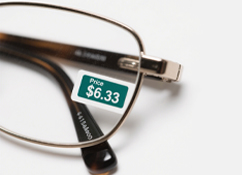My Kid’s Myopia Prescription Hasn’t Changed—Can We Just Replace the Eyeglass Frame? (Pros, Cons & Risks)
Any parent who’s dealt with kids’ glasses knows this: frames get banged up way faster than lenses. Your child’s prescription hasn’t changed, but their frame is cracked, bent, or covered in sticky fingerprints (thanks, snack time)—so you’re probably asking: Can we just swap the frame and keep the old lenses?
The short answer: Yes, you can—but only with help from a licensed optometrist or eyewear professional. Doing it yourself (or at a discount shop without checks) risks messing up your kid’s vision. Here’s why professional help matters, plus how to do it safely.
H2: Why You Need Professional Help (It’s Not Just “Fitting a Frame”)
Lenses aren’t one-size-fits-all—they’re custom-ground to match the original frame’s exact dimensions and your child’s eye measurements. When you swap frames, even small differences can throw off critical details like:
Pupillary distance (PD): The distance between your child’s pupils (usually 45–65mm for kids). Lenses have an “optical center” that must line up perfectly with this spot.
Astigmatism axis: If your child has astigmatism, the lens is shaped to correct it at a specific angle (0–180 degrees). A mismatched frame can twist this angle.
Lens position: Frames have a “bridge size” (distance between the nose pads) and “temple length”—too wide/narrow, and the lens won’t sit where it needs to.
Without a pro checking these, the new frame + old lens combo might not correct vision properly—and could even cause headaches or eye strain.
How to Safely Replace Your Kid’s Frame (Step-by-Step)
If you want to reuse lenses, follow these rules to avoid mistakes:
1. Choose the Same (or Nearly Identical) Frame Size & Shape
Look for the exact same style/model as the original if possible. If it’s discontinued, pick a frame with almost identical dimensions (check the frame’s “size code”—usually printed inside the temple arm, like “52-18-135,” which means lens width: 52mm, bridge size: 18mm, temple length: 135mm).
Why? Lenses are cut to fit the original frame’s width, lens height, and curve. A frame that’s even 2–3mm too big or small can leave gaps, crack the lens, or shift the optical center.
2. Check Lens-Frame Compatibility
Not all frames work with all lenses—especially for kids with strong prescriptions (e.g., -4.00 diopters or more). Thick lenses need sturdier frames to hold them; thin, lightweight frames might bend under heavy lenses.
A pro will:
Check if the new frame’s “lens groove” (the slot where the lens sits) is deep enough for your child’s lenses.
Make sure the frame material (plastic, metal, titanium) can support the lens weight without breaking.
3. Test the Fit Before Finalizing
Once the pro attaches the old lens to the new frame, have your kid try it on right away. Ask:
“Does it feel tight or loose on your nose/ears?”
“Do your eyes feel strained when you look at something far away?”
“Is there any part of the frame rubbing your cheeks or temples?”
A good fit should be snug but not uncomfortable—no slipping, pinching, or pressure points.
Pros of Reusing Lenses & Replacing Only the Frame
Reusing lenses makes sense for busy parents—and here’s why it works:
Saves money: New lenses can cost $50–$200+ (depending on the prescription and lens type, like high-index). Reusing old lenses cuts that cost entirely.
Skips the “new lens adjustment period”: Some kids get dizzy, notice blurriness, or feel “off” with new lenses—even if the prescription is identical. Reusing their familiar lenses avoids that hassle.
Catches growth-related changes: When you visit a pro, they’ll also check if your child’s PD or face shape has changed (kids grow fast!). If measurements are off, they can adjust the frame or lens position to fix it.
Cons of Replacing Just the Frame (Risks to Avoid)
Reusing lenses isn’t without downsides—here’s what to watch for:
Messed-up optical alignment: Even a 1mm difference in frame size can shift the lens’s “optical center” (the spot that lines up with your child’s pupils). If it’s misaligned, your kid might get headaches, feel dizzy, or struggle to focus—even with the right prescription.
Lens damage during fitting: Lenses are delicate—prying them out of the old frame or forcing them into the new one can scratch the coating, crack the edge, or warp the lens. A pro uses tools to remove/reinsert lenses safely.
Comfort issues with the new frame: Even if lenses fit, the new frame’s weight, nose pad shape, or temple length might feel different. Some kids hate the “new frame feel” and refuse to wear them—so let your kid pick the frame (within reason!) to avoid battles.
Final Tip for Parents: Never DIY This
It might be tempting to buy a cheap frame online and swap lenses yourself, but don’t do it. Licensed optometrists or eyewear shops:
Have tools to safely remove/reinsert lenses without damage.
Verify that all optical parameters (PD, astigmatism axis) still match.
Adjust the frame to fit your child’s face perfectly.
A bad DIY job could lead to your kid avoiding their glasses (or worse, hurting their eyesight). It’s worth the extra $20–$50 for a professional fitting to keep their vision on track.
FAQ: Replacing Frames for Kids’ Glasses
Q: Can we reuse lenses if the frame is a different brand?
A: Maybe—if the brand’s frame has exact same dimensions (lens width, bridge size, lens height) as the original. A pro will measure both frames to confirm.
Q: How long does a frame replacement take?
A: Most shops can do it in 15–30 minutes if the new frame is in stock.
Q: What if the lenses are scratched? Should we still reuse them?
A: No—scratched lenses can cause eye strain. If the lenses have deep scratches, it’s better to get new ones, even if the prescription is the same.











